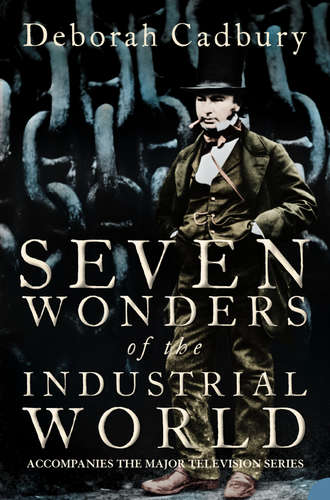
Полная версия
Seven Wonders of the Industrial World
I have great cause to complain of neglect or to say the least of it of inattention to my orders and remonstrances. My instructions even when repeated frequently and formally in writing are much disregarded … Mr Russell, I regret to say, no longer appears to attend either to my friendly representations and entreaties or to my own formal demands and my duty to the company compels me to state that I see no means of obtaining proper attention to the terms of the contract otherwise than by refusing to recommend the advance of any more money.
Dark clouds were gathering over the shipyard. If Scott Russell were eventually made bankrupt, the Great Ship might belong to the creditors. A crisis was reached when Martin’s, Scott Russell’s bankers, refused to honour his cheques. Scott Russell laid off the workers in the yard, saying he could no longer continue with the work. The board of Eastern Steam, on Brunel’s advice, seized the Great Ship, stating that Scott Russell had breached his contract. The creditors were informed, the accountants moved in, and work on the Great Ship came to a complete stop.
The board submitted a claim on Scott Russell’s estate citing breach of contract, only to find there was no estate left on which they could claim. Brunel had been unaware that Scott Russell had mortgaged his yard and that there were a number of creditors, Beale and Co., the iron manufacturer, being the largest. Apart from the mounting debt and the missing iron, it emerged that although only about a quarter of the work had been completed on the hull, Scott Russell had somehow been paid £292,295. The board of Eastern Steam and its worried shareholders now found themselves in the hands of Martin’s Bank, which had prior claims. After much difficult discussion the bank acknowledged that Eastern Steam had rights too, and agreed to renew the lease of the shipyard – but just until August 1857.
Brunel was understandably worried. ‘I feel a much heavier responsibility now thrown upon me than I ever intended to take upon myself,’ he wrote. He still had Hepworth and Dickson from Scott Russell’s establishment to work with, and, better still, Daniel Gooch, a colleague and old friend involved in his railway commissions, was approved as his assistant. Scott Russell, however, was humiliated. ‘I intend to be very cautious and to keep every string which it devolves on me to pull, tightly in my own hands,’ Brunel told him. ‘It would therefore be in the position of an assistant of mine – that I should propose to engage your services.’
The last two years had been immensely difficult for Brunel as he tried to bring his work of creative genius to fruition. The burden of organising such a vast project against such a fraught background was beginning to exact a price. He had taken liberties all his life with his strong constitution and robust health, ignoring warnings, winning glory and generally taking life at a gallop, but now the rumour spread that he was ill. With little over a year left in which to launch his Great Ship before the bank took control of the yard, Brunel was facing the supreme test of his entire career.
‘Where is man to go for a new sight?’ asked The Times in April 1857. ‘We think we can say. In the midst of that dreary region known as Millwall, where the atmosphere is tarry, and everything seems slimy and amphibious, where it is hard to say whether the land has been rescued from the water or the water encroached upon the land … a gigantic scheme is in progress, which if not an entire novelty, is at as near an approach to it as this generation is ever likely to witness.’ The excitement was tangible; with Brunel in complete charge work progressed so well that by June the ship was almost ready for launching. The Great Eastern had become the talk of Europe.
However, the optimism of the summer dissolved as endless difficulties connected with the launch arose. After much negotiation, a new launch date was agreed with Martin’s Bank for October 1857. If the ship was not in the Thames by this date, the creditors would claim the yard and ‘we will be in the hands of the Philistines,’ declared company secretary John Yates. The fifth of October arrived and Brunel, not satisfied that everything was ready for the launch, had no alternative but to defer the date once again. The mortgagees seized the yard and refused access to all working on the ship. The situation had become impossible. Brunel was now put under immense pressure to agree to launch on the next ‘spring tide’ of 3 November and the company was charged large fees for the delay.
As the Great Ship stood helplessly inert, waiting at the top of two launch-ways, her brooding shape invited much comment. Many thought she was unlaunchable and would rust where she was. Other wise ‘old salts’ predicted that if she ever did finally find the sea, the first wave would break her long back in half. Brunel never doubted; but no matter how carefully he planned the coming operation, there were still many unknowns and little time to test the equipment. In the small hours of the cold autumn nights it seemed he was attempting the impossible. He was proposing to move an unwieldy metal mountain more than four storeys high down a precarious slope towards a high tide with untried equipment.
The plan for launching the ship sounded simple. Hydraulic rams would gently persuade her down the launch-ways. Tugs in the river, under the command of Captain Harrison, could also ease her towards the river, and there were restraining chains to hold her back should she move too fast. Two wooden cradles, 120 feet wide, were supporting the ship and they rested on launch-ways of the same width. Iron rails were fixed to the launch-ways and iron bars 1 inch thick were attached to the base of the cradles and both surfaces were greased to enable the vessel to slide easily down the launch-way gradient.
As the spring tide of 3 November approached, work on the ship became more frenzied. At night, 1,500 men working by gaslight carried on with last minute instructions from Brunel. Brunel himself never left the yard, sleeping for a few hours when exhausted on a makeshift bed in a small wooden office. He issued special instructions to everyone involved with the launch, saying:
The success of the operation will depend entirely upon the perfect regularity and absence of all haste or confusion in each stage of the proceedings and in every department, and to attain this nothing is more essential than perfect silence. I would earnestly request, therefore, that the most positive orders be given to the men not to speak a word, and that every endeavour should be made to prevent a sound being heard, except the simple orders quietly and deliberately given by those few who will direct.
Unfortunately for Brunel, perfect silence was not a high priority with the board of the Eastern Steam Navigation Company. For months now, the company had borne the disastrous haemorrhage of enormous amounts of money into the Great Ship. The launching presented them with a small chance to recoup some of those losses. Unknown to Brunel, they had sold over 3,000 tickets to view the launch from Napier shipyard. Newspapers, too, had played their part, informing the public that an event worthy of comparison with the Colosseum was about to take place at Millwall. ‘Men and women of all classes were joined together in one amicable pilgrimage to the East,’ reported The Times. ‘For on that day at some hour unknown, the Leviathan was to be launched at Millwall … For two years, London – and we may add the people of England – had been kept in expectation of the advent of this gigantic experiment, and their excitement and determination to be present at any cost are not to be wondered at when we consider what a splendid chance presented itself of a fearful catastrophe.’
The launch place of the Leviathan presented a chaotic picture to Charles Dickens. ‘I am in an empire of mud … I am surrounded by muddy navigators, muddy engineers, muddy policemen, muddy clerks of works, muddy, reckless ladies, muddy directors, muddy secretaries and I become muddy myself.’ He noted that ‘a general spirit of reckless daring’ seemed to animate the ‘one hundred thousand souls’ crammed in and around the yard, upon the river and the opposite bank. ‘They delight in insecure platforms, they crowd on small, frail housetops, they come up in little cockleboats, almost under the bows of the Great Ship … many in that dense floating mass on the river and the opposite shore would not be sorry to experience the excitement of a great disaster.’
In the dull light of the November morning the scene that greeted Brunel as he emerged from his makeshift quarters was one of confusion and noise, with uncontrollable crowds swarming over his carefully placed launch equipment. All of fashionable London, displaying intense curiosity, expecting to be amused, charmed, and hopefully thrilled, was taking the air in Napier shipyard. Then, almost farcically, in the midst of preparations, a string of unexpected distinguished visitors turned up in all their finery, first the Comte de Paris and then, complete with a retinue resplendent in gold cloth, the ambassador of Siam. A half-hearted attempt at a launching ceremony saw the daughter of Mr Hope, the chairman of the board, offering the token bottle of champagne to the ship. Brunel refused to associate himself with it. She got the name wrong, christening the ship ‘Leviathan’, which nobody liked since all of London had already decided on the Great Eastern.
The whole colourful funfair scene was terribly at odds with the cold, clinically precise needs of the launching operation. Brunel felt betrayed, as he later told a friend: ‘I learnt to my horror that all the world was invited to “The Launch”, and that I was committed to it coûte que coûte. It was not right, it was cruel; and nothing but a sense of the necessity of calming all feelings that could disturb my mind enabled me to bear it.’
Brunel had no alternative but to make the attempt in spite of the difficulties. He stood high up on a wooden structure, against the hull, his slight figure wearing a worn air, stovepipe hat at an angle, habitual cigar in his mouth. He held a white flag in his hand, poised like a conductor waiting to begin the vast unknown music.
As his flag came down, the wedges were removed, the checking drum cables eased, and the winches on the barges mid-river took the strain. For what seemed an eternity, nothing happened. The crowd, which had been quiet, grew restive. Brunel decided to apply the power of the hydraulic presses. Suddenly, with thunderous reverberation, the bow cradle moved three feet before the team applied the brake lever on the forward checking drum. Immediately, accompanied by a rumbling noise, the stern of the great hull moved four feet. An excited cry went up from the crowd: ‘She moves! She moves!’ In an instant the massive cables of the aft checking drum were pulled tight, causing the winch handle to spin. As the winch handle ‘flew round like lightning’, it sliced into flesh and bone, and tossed the men who were working the drum into the air like flotsam. The price the team paid for not being entirely awake to the quickly changing situation was four men mutilated. Another man, the elderly John Donovan, sustained such fearful injuries he was considered a hopeless case and was taken to a nearby hospital where he soon died.
Later that afternoon, Brunel tried to move the hull once more but a string of minor accidents and the growing dark persuaded him to finish for the day. In the words of Brunel’s 17-year-old son Henry, ‘the whole yard was thrown into confusion by a struggling mob, and there was nothing to be done but to see that the ship was properly secured and wait till the following morning’.
The spring tide had come and gone, the next one was not for another month; another month of extortionate fees while the ship lay on the slipway. Brunel was determined to get the ship completely on to the launch-ways as soon as possible. He was very concerned that while the ship was half on the building slip (whose foundation was completely firm) and half on the launch-ways (which had more give) the bottom of the hull could be forced into a different shape. His urgent task was to get the ship well down the launch-ways to the water’s edge in case the hull started to sink into the Thames mud under its immense weight. The fiasco of 3 November at least provided information on how to manage the launch more effectively. Some alterations were made to improve the equipment and another attempt at the launch was made on the nineteenth. This was a huge disappointment with the hull moving just 1 inch. Clearly, more would have to be done.
The winches on the barges mid-river had been ineffective and all four were now mounted in the yard, their cables drawn under the hull and across to the barges; but even chains of great strength and size broke when any strain was put on them. ‘Dense fog made it almost impossible to work on the river,’ observed Henry Brunel. ‘Moreover, there seemed a fatality about every attempt to get a regular trial of any part of the tackle.’ Two more hydraulic presses were added to the original two, giving a force of 800 tons at full power.
By 28 November, Brunel felt confident enough to try to move the Great Ship once more. From a central position in the yard, Brunel signalled his instructions with a white flag. The hydraulic presses were brought up to full power and, to the accompaniment of terrifying sounds of cracking timber and the groaning and screeching of metal, slowly the ship moved at a rate of one inch per minute. As before, though, the tackle between the hull and the barges proved unreliable and Captain Harrison and his team found themselves endlessly repairing chains. In spite of the difficulties, by the end of the day the ship had been moved fourteen feet and there was renewed hope of floating the ship on the high tide of 2 December. An early start on 29 November saw the river tackle yet again let them down and the four hydraulic presses pushed to their maximum could not move the ship. Hydraulic jacks and screw jacks were begged and borrowed and by nightfall another 8 feet had been claimed so that by the thirtieth the ship had moved 33 feet in total and hope now had real meaning. But then one of the presses burst a cylinder, which killed off any possibility of a December launch.
Brunel would not be defeated though, and throughout December he carried on inching the colossal black ship down the launch-ways. Each day it was becoming more reluctant to start. ‘While the ship was in motion,’ noted Henry Brunel, ‘the whole of the ground forming the yard would perceptibly shake, or rather sway, on the discharge of power, stored up in the presses and their abutments.’ In the freezing fogs of December and January, the hundreds of workers were heard, rather than seen, as the yard echoed with the sounds of orders and endless hammering. The gangs sang to relieve their boredom as they mended the chains. At night, gas flares lit the scene and fires burned by the pumps and presses to stop them freezing up. With the small figures of the workers beneath the huge black shape in the mist, which was red from the many fires, it gave the impression that some unearthly ritual was being enacted on this bleak southerly bend in the Thames.
Brunel was coming to the conclusion that the pulling power he had hoped to obtain from the barges and tugs on the river was not going to be enough and that his best hope lay in providing much more power to push the ship into the river. The railway engineer, Robert Stephenson, a friend who had come to view the operation, agreed and orders were placed with a Birmingham firm, Tangye Bros, for hydraulic presses capable of much more power.
The whole country was following Brunel’s efforts to launch the reluctant ship and the press were increasingly critical. ‘Why do great companies believe in Mr Brunel?’ scoffed The Field. ‘If great engineering consists in effecting huge monuments of folly at enormous cost to share holders, then is Mr Brunel surely the greatest of engineers!’ There was no shortage of letters offering diverse advice. One reverend gentleman thought the best plan was to dig a trench up to the bows and then push the ship in. Another claimed that 500 troops marching at the double round the deck would set up vibrations that would move the vessel. Yet another idea was to float the ship to the river on cannon balls or even shoot cannon balls into the cradles. Scott Russell, too, aired his theories on just why the ship was ‘seizing up’ and reluctant to move. He suggested the two moving surfaces should have been wood not iron.
December and January were bitterly cold. By day, the ship looked mysterious in dense fogs; the nights were black as the river itself. Brunel stood alone against a background of criticism; his sheer unremitting determination to get the ship launched permeated every impulse. By early January, he had acquired eighteen hydraulic presses and they were placed nine at each of the cradles. It was thought that their combined power was more than 4,500 tons.
The new hydraulic presses were so successful that as the month advanced the Thames water was lapping her hull. The next high tide of the thirtieth was set for launch day. But the night of the twenty-ninth brought sheeting horizontal rain and a strong southwesterly wind. Brunel knew that if they got the ship launched, the difficulties of managing the craft in the shallow waters of the Thames, where at this point it was not much wider than the length of the ship, would be considerable in such high winds. Miraculously, though, 31 January was still and calm. The Thames shimmered like a polished surface.
At first light, Brunel started the launch process in earnest. Water which had been pumped into the ship the day before to hold her against the strong tide was now pumped out. The bolts were removed from wedges that were holding the ship. Nothing more could be done until the tide came up the river, which it did with surprising speed and force. Messengers were sent with desperate urgency to collect the men in order not to miss the opportunity which seemed to have arrived at last. The hydraulic presses were noisy with effort and the great Tangye’s rams hissed and pushed at the massive structure. Two hours of shoving and straining and tension down the last water-covered part of the launch-ways saw the vast iron stern afloat. The forward steam winch hauled and, quickly, the huge bow responded and moved with solemn deliberation into the water. There were no crowds to witness this defining moment; just a few curious onlookers there by accident as the colossal ship moved from one element to another. As the news spread, bells rang out across London as the Great Eastern floated for the first time.
Brunel, who had not slept for 60 hours, was able to board with his wife and son and at last could feel the movement of the ship as she responded to the currents of the Thames beneath her. Four tugs took the Great Eastern across the river to her Deptford mooring where she could now be fitted out. The cost of the launch was frightening – some estimates suggest as much as £1,000 per foot – and the ship had so far consumed £732,000, with Brunel putting in a great deal of his own money. But the cost to Brunel’s health was higher still. Over the past few months he had pushed himself to the limits of endurance. It seemed the Great Ship owned him in body and soul and gave him no relief from the endless difficulties of turning his original vision into a reality. Now that the Great Eastern was finally in the water after years, Brunel’s doctors insisted that he take a rest.
When Brunel returned in September 1858 he found that the Eastern Steam Navigation Company was in debt, that there was no money to fit the ship out and there was talk of selling her. The company tried to raise £172,000 to finish the work on the ship, but this proved impossible. The financial problems of the board were only resolved when they formed a new company, ‘the Great Ship Company’, which bought the Great Eastern for a mere £160,000, and allotted shares to shareholders of Eastern Steam in proportion to their original holding. Brunel was re-engaged as engineer and, with his usual energy, became busy with designs for every last detail, even the skylights and rigging. Yet he was harassed now with health problems and doctors diagnosed his recurring symptoms as ‘Bright’s disease’, with progressive damage to his kidneys. They insisted that he must spend the winter relaxing in a warmer climate. The last thing Brunel wanted was to leave his Great Ship when there was still so much to supervise. Reluctantly, he agreed to travel to Egypt with his wife and son, Henry.
Before he left, with memories of the impossible position that the board had faced when dealing with Scott Russell, he urged them to ensure that any contract they entered into for fitting out the ship was absolutely binding. However, with Brunel abroad and clearly unwell, the board, left with bringing to completion such a unique vessel, opted for the devil they knew. Scott Russell had built the hull and he was building the paddle engines. He was, after Brunel, the man who knew most about the Great Ship. It was not long before the charming, charismatic Scott Russell with his delightfully low-priced, somewhat ambiguous contract was back on board.
In May 1859, Brunel returned. The enforced holiday appeared to have been beneficial and his friends were hopeful that he was fully recovered. Privately, he knew this was not the case. His doctors had made it quite clear that his disease was progressing relentlessly. Only so much time was left for him and he should certainly not overexert himself. Yet, for Brunel, rest was out of the question. Whatever private bargain he may have made with himself, it proved impossible for him to resist the pull of the Great Eastern. His ship came first, whatever the cost.
With the maiden voyage planned for September, all Brunel could see was the enormous amount still needing to be done. So he rented a house near the ship and, with his usual energy, dealt daily with the many problems that needed his expert attention. Everything from the engine room to the rigging was checked; the best price of coal ascertained; the crew for the sea trials named; progress reports on the screw engines prepared; notes for Captain Harrison; advice on the decoration in the grand saloon: nothing escaped his practised eye. On 8 August 1859, a grand dinner was given for MPs and members of the House of Lords in the richly gilded rococo saloon but Brunel was too exhausted to attend. It was a glamorous occasion and, in Brunel’s absence, Scott Russell rose to it, shining in the glowing approbation of the distinguished audience.
On 5 September, Brunel was back on board his ship. He had chosen his cabin for the maiden voyage and stood for a moment on deck by the gigantic main mast while the photographer recorded the event. He had lost weight; his face was thinner, his clothes hung on him. In one hand he held a stick to help him get about; his shoes were clean and polished. He had a fragile, expended air. As he looked at the camera – his eyes, as always, concentrating, absorbed in some distant prospect – he looked like a man with little time left. Just two hours later he collapsed with a stroke. He was still conscious as his colleagues carried him very carefully to his private coach and slowly drove him home to Duke Street as though he were breakable.
The Great Eastern made her way alone now, without Brunel’s attention, directed by fussing tugs down the Thames to Purfleet in Essex and beyond for her sea trials. Once out to sea, she was magnificent. ‘She met the waves rolling high from the Bay of Biscay,’ reported The Times. ‘The foaming surge seemed but sportive elements of joy over which the new mistress of the ocean held her undisputed sway.’
With Brunel lying paralysed at home in Duke Street, Captain Harrison was now in charge, but his command was diluted as the engine trials took place. The two engine rooms were supervised by the representatives of the firms responsible for the engines; Scott Russell put his man Dixon in charge of the paddle engine room. Brunel had designed many new and innovative features for the smoother running of his ship, some of which those in charge were neither familiar with nor even aware existed. No one had the same intimate understanding of the complex workings of the ship as Brunel and if his familiar figure had been on board, in total charge with his boundless energy and sharp mind directing proceedings, it is possible the accident would never have happened.






